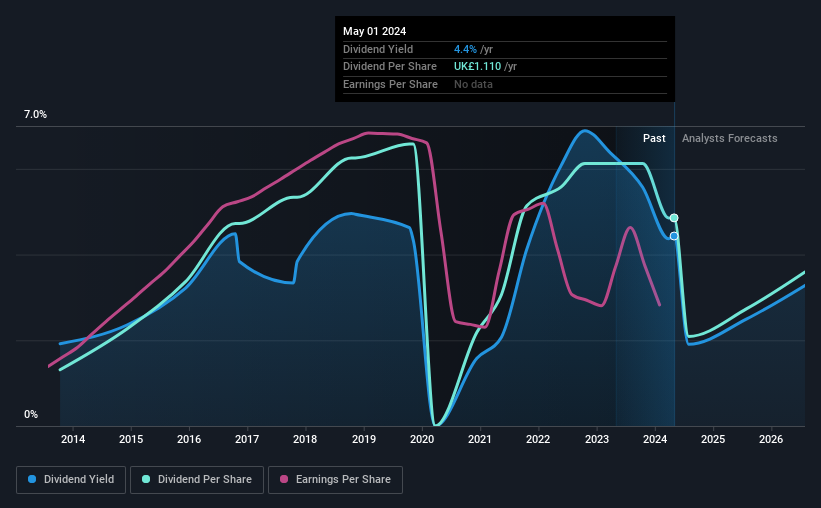Bellway's (LON:BWY) Dividend Will Be Reduced To £0.16
Bellway p.l.c.'s (LON:BWY) dividend is being reduced from last year's payment covering the same period to £0.16 on the 1st of July. This means that the annual payment will be 4.4% of the current stock price, which is in line with the average for the industry.
View our latest analysis for Bellway
Bellway's Earnings Easily Cover The Distributions
Solid dividend yields are great, but they only really help us if the payment is sustainable. The last payment was quite easily covered by earnings, but it made up 204% of cash flows. The company might be more focused on returning cash to shareholders, but paying out this much of its cash flow could expose the dividend to being cut in the future.
Over the next year, EPS is forecast to expand by 36.2%. Assuming the dividend continues along recent trends, we think the payout ratio could be 47% by next year, which is in a pretty sustainable range.
Dividend Volatility
The company's dividend history has been marked by instability, with at least one cut in the last 10 years. The annual payment during the last 10 years was £0.30 in 2014, and the most recent fiscal year payment was £1.11. This works out to be a compound annual growth rate (CAGR) of approximately 14% a year over that time. Dividends have grown rapidly over this time, but with cuts in the past we are not certain that this stock will be a reliable source of income in the future.
Dividend Growth Potential Is Shaky
With a relatively unstable dividend, it's even more important to evaluate if earnings per share is growing, which could point to a growing dividend in the future. Over the past five years, it looks as though Bellway's EPS has declined at around 16% a year. Such rapid declines definitely have the potential to constrain dividend payments if the trend continues into the future. Over the next year, however, earnings are actually predicted to rise, but we would still be cautious until a track record of earnings growth can be built.
The Dividend Could Prove To Be Unreliable
Overall, it's not great to see that the dividend has been cut, but this might be explained by the payments being a bit high previously. With cash flows lacking, it is difficult to see how the company can sustain a dividend payment. We would be a touch cautious of relying on this stock primarily for the dividend income.
It's important to note that companies having a consistent dividend policy will generate greater investor confidence than those having an erratic one. However, there are other things to consider for investors when analysing stock performance. As an example, we've identified 1 warning sign for Bellway that you should be aware of before investing. If you are a dividend investor, you might also want to look at our curated list of high yield dividend stocks.
Have feedback on this article? Concerned about the content? Get in touch with us directly. Alternatively, email editorial-team (at) simplywallst.com.
This article by Simply Wall St is general in nature. We provide commentary based on historical data and analyst forecasts only using an unbiased methodology and our articles are not intended to be financial advice. It does not constitute a recommendation to buy or sell any stock, and does not take account of your objectives, or your financial situation. We aim to bring you long-term focused analysis driven by fundamental data. Note that our analysis may not factor in the latest price-sensitive company announcements or qualitative material. Simply Wall St has no position in any stocks mentioned.

 Yahoo Finance
Yahoo Finance 
